Can bearded dragons eat worms male and female bearded dragon owners often ask this common question when feeding their pets. Worms are a popular choice, but not all types are safe or suitable.
Both beginners and experienced reptile keepers want to know: Can bearded dragons eat worms male and female bearded dragon diets the same way? Does gender or age affect what kind of worms they should eat?
This article explores the safest worm types for bearded dragons. You’ll also learn how often to feed them and what risks to avoid. If you’re unsure about adding worms to your dragon’s routine, this guide will help you make an informed decision.
Can Bearded Dragons Eat Worms Safely? What You Must Know First
Worms may seem like a harmless treat, but can bearded dragons eat worms safely? Understanding the risks and benefits is key before adding them to your beardie’s diet. In this section, we’ll explore which worms are safe, which to avoid, and what every owner must consider first.
Is Feeding Worms to Bearded Dragons a Natural Choice?
Yes, feeding worms to bearded dragons is a natural part of their insectivorous diet, especially in captivity. In the wild, they forage for a variety of insects and invertebrates, including worms. These offer hydration, protein, and mental stimulation through the hunting process. Worms mimic live prey and help satisfy their natural instinct to chase and catch moving food. However, not all worms are suitable for every bearded dragon. Some are high in fat or chitin, which can lead to digestive issues or weight gain. While worms are a natural food source, they should never be the only one. A diverse diet that includes vegetables, leafy greens, and other insects ensures balanced nutrition. Offering worms occasionally as treats or protein boosts is perfectly safe. Just be sure to rotate them with other feeder insects. Feeding worms should support, not dominate, a bearded dragon’s diet. As a natural choice, they can be healthy when offered in moderation and prepared correctly.
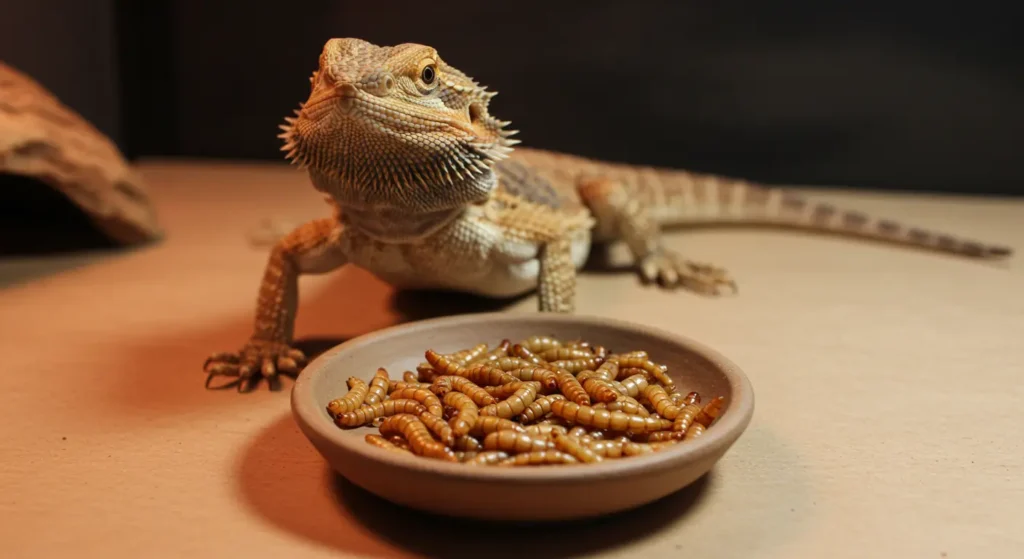
Which Worms Are Considered Safe in a Reptile’s Diet?
Several types of worms are safe for bearded dragons when sourced and handled properly. Earthworms, hornworms, butterworms, and silkworms are among the healthiest options. These are rich in moisture and protein, and generally low in fat. Hornworms are especially hydrating, making them great during warmer months or brumation prep. Butterworms are soft and easy to digest, especially for juveniles. Silkworms offer a good calcium-to-phosphorus ratio, which supports bone health. Superworms and mealworms can be fed occasionally but come with cautions. Their tough exoskeletons can cause impaction if fed too often or to young dragons. Wild-caught worms should be avoided completely. They may carry parasites, pesticides, or harmful bacteria that can make your pet sick. Always choose feeder worms from reputable sources. Clean, gut-load, and occasionally dust them with calcium before feeding. By selecting the right worms, you help support your bearded dragon’s digestive health and nutritional balance.
Can Baby or Juvenile Bearded Dragons Eat Worms Too?
Yes, baby and juvenile bearded dragons can eat worms, but portion size and type are critical. Young dragons have delicate digestive systems and smaller mouths, so you must choose softer worms. Silkworms, small earthworms, and butterworms are ideal because they’re easier to digest and less likely to cause impaction. Avoid feeding hard-shelled worms like mealworms to babies, as their tough exoskeleton can block the digestive tract. Always offer worms that are no larger than the space between the baby dragon’s eyes. This prevents choking and ensures easier digestion. Baby dragons also need higher protein intake than adults to support rapid growth. Worms are a great source of protein, but they should be rotated with crickets, roaches, and soft greens. Limit fatty worms like waxworms to occasional treats only. By choosing the right worms and feeding them properly, you’ll support your young dragon’s healthy development without risking digestive problems.
When Is It Risky to Offer Worms to Your Pet Lizard?
Feeding worms to your bearded dragon becomes risky under certain conditions. One major risk is impaction, especially if you feed hard-shelled worms like superworms or mealworms to small or dehydrated dragons. Another issue is overfeeding fatty worms like waxworms or butterworms, which can lead to obesity and nutritional imbalance. It’s also risky to offer worms that are too large, as this may cause choking or digestive blockage. Wild-caught worms are the biggest danger of all. They often carry parasites, harmful bacteria, or chemical residues. Feeding sick or recovering dragons worms can also be risky if their digestion is slow or compromised. Additionally, avoid worms during brumation, as bearded dragons are less active and may not digest food properly. Always monitor your pet after introducing new worms and start with small quantities. If you see signs of bloating, constipation, or reduced activity, stop feeding and consult a reptile vet. Caution and observation are key to avoiding complications.
Nutritional Value of Worms in a Bearded Dragon’s Diet
How Worms Provide Protein, Moisture, and Fat
Worms are a valuable addition to a bearded dragon’s diet because they provide three key nutrients: protein, moisture, and fat. Protein supports muscle growth, organ function, and repair—especially important for juvenile dragons during rapid development. Most feeder worms, like earthworms and silkworms, offer a high-protein profile that complements other insect options.
Moisture is another benefit. Some worms, like hornworms and earthworms, contain up to 85% water. This helps keep bearded dragons hydrated, especially if they’re not drinking regularly from a bowl or dropper.
Fat levels vary depending on the worm species. Butterworms and waxworms are higher in fat, making them suitable as occasional treats. Superworms and mealworms contain moderate levels, while silkworms and hornworms are leaner. Balancing fat intake is important to avoid weight gain, particularly in adult dragons. Worms can be a nutritious protein and moisture source when offered in proper portions and as part of a varied diet.
Vitamins and Minerals Found in Common Feeder Worms
Feeder worms aren’t just protein sources—they also offer a range of essential vitamins and minerals. Earthworms contain moderate amounts of iron, copper, and manganese, which help with oxygen transport, metabolism, and immune function. Silkworms provide vitamin B complex and vitamin E, which support nerve function and reproductive health.
Calcium and phosphorus are two of the most important minerals for bearded dragons. However, most worms don’t offer an ideal calcium-to-phosphorus ratio, which is crucial for bone strength and preventing metabolic bone disease (MBD). That’s why calcium supplementation is usually required when feeding worms.
Some worms, like phoenix worms (black soldier fly larvae), naturally have a better calcium profile and can be used more often. Still, it’s essential to rotate worm types and dust them with calcium powder when needed. While worms contribute valuable micronutrients, they shouldn’t be the only nutrient source in a dragon’s diet. Used wisely, they enhance variety and help prevent deficiencies.
Are Worms a Healthy Staple or Just a Treat?
Worms can be a healthy part of a bearded dragon’s diet, but they shouldn’t be the main staple. While they are rich in protein and moisture, many feeder worms are low in calcium or high in fat. For example, waxworms and butterworms are very fatty and best used as occasional treats. Feeding these too often can lead to obesity or nutritional imbalance.
Other worms, like hornworms and silkworms, are lower in fat and easier to digest. These are better options for more frequent feeding. However, even the healthiest worms lack certain nutrients that dragons need from greens and other insects.
A true staple food should offer complete nutrition or be paired with calcium-rich sources. Dubia roaches, leafy greens, and calcium-dusted vegetables meet that standard better than worms alone. In summary, worms are excellent supplements or treats, not staples. Feed them 1–3 times a week depending on the type, your dragon’s age, and activity level.
Balancing Worms with Leafy Greens and Insects
To keep your bearded dragon healthy, it’s important to balance worms with leafy greens and other insects. While worms are rich in protein and moisture, they don’t offer the full nutritional profile your beardie needs. Leafy greens like collard, mustard, and dandelion provide essential fiber, calcium, and vitamins A and K. These support digestion, hydration, and bone health.
Insects like Dubia roaches and crickets are leaner and have better calcium-to-phosphorus ratios than most worms. They make great staple proteins for both juvenile and adult dragons. By rotating insects and plant foods, you reduce the risk of overfeeding fatty worms or missing vital nutrients.
Try following the 80/20 rule for adults: 80% vegetables and greens, 20% insects and worms. For juveniles, increase the protein to 50% or more while still offering soft greens daily. Dust worms and insects with calcium powder 2–3 times per week. A balanced diet that includes worms in moderation helps support your bearded dragon’s long-term health.
Feeding Worms to Bearded Dragons: Frequency, Portion, and Prep
Feeding worms to bearded dragons isn’t just about tossing a few into the enclosure. To keep your beardie healthy, it’s important to understand the right frequency, portion sizes, and preparation steps. In this section, we’ll break down how to feed worms safely and effectively based on your dragon’s age and dietary needs.
How Often Can Bearded Dragons Eat Worms Based on Age?
The frequency of feeding worms to bearded dragons depends heavily on their age and growth stage. Baby and juvenile bearded dragons need more protein to support rapid growth. For them, you can offer worms 3 to 4 times per week, mixed with other protein sources like crickets or Dubia roaches. Avoid making worms the only protein option, especially fatty ones like waxworms.
Adult bearded dragons, on the other hand, require fewer insects overall. Their diet should consist mostly of leafy greens and vegetables. You can offer worms once or twice per week as a treat or occasional protein boost.
Always consider the worm type when feeding. Fatty worms like butterworms or waxworms should only be given occasionally to any age group. Leaner options like silkworms or hornworms are better for more frequent use. Keep the feeding schedule varied and monitor your beardie’s weight and energy levels for best results.
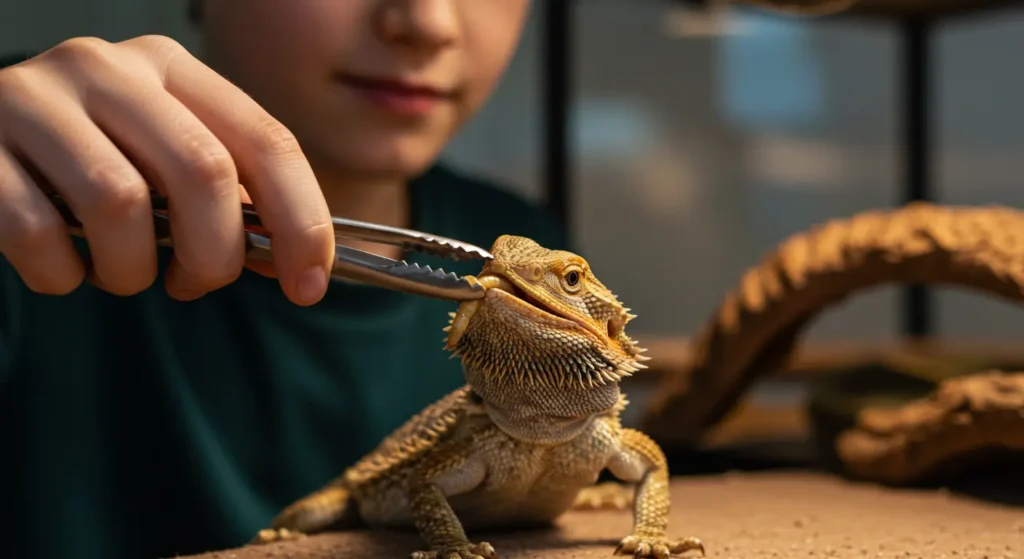
Proper Worm Sizes for Baby, Juvenile, and Adult Dragons
Choosing the right worm size is crucial for safe feeding and digestion. A general rule is to never feed a worm wider than the space between your dragon’s eyes. This reduces the risk of choking or impaction.
Baby bearded dragons require small, soft-bodied worms like micro silkworms or small earthworms. Avoid mealworms at this stage, as their hard exoskeleton can cause digestive blockages.
Juveniles can handle slightly larger worms such as mid-sized hornworms or cut-up superworms. Still, it’s important to supervise feeding and offer a variety of insect types.
Adult dragons can consume larger worms like full-sized superworms or nightcrawlers. However, moderation is still key. Large worms can cause bloating or impaction if fed too often. Always watch how your dragon handles different sizes and adjust accordingly to prevent health issues.
Should Worms Be Live, Dried, or Fresh?
Worms come in various forms: live, dried, and canned (freshly preserved). Each option has pros and cons, depending on your dragon’s health and feeding preferences.
Live worms are the most natural choice. They encourage hunting behavior and provide hydration, especially species like hornworms and earthworms. However, they require proper storage and care.
Dried worms are convenient and shelf-stable. But they lose much of their natural moisture and can be harder to digest. Use dried worms only as occasional treats and always rehydrate them before feeding.
Canned or preserved worms are easier to store and safer than wild-caught options. They retain more nutrients than dried worms but still lack the hydration of live prey.
Whenever possible, offer live worms from trusted sources. The movement stimulates appetite and mental engagement, especially for picky or inactive bearded dragons.
Gut-Loading and Dusting Worms for Nutrient Boost
To maximize nutrition, feeder worms should be gut-loaded and dusted before feeding. Gut-loading means feeding the worms a nutritious diet 24–48 hours before offering them to your bearded dragon. Use dark leafy greens, squash, carrots, and commercial gut-loading formulas. This enriches the worm’s body with essential vitamins and minerals.
Dusting involves coating the worms with calcium or multivitamin powder right before feeding. Use calcium with D3 two to three times a week if your dragon doesn’t get enough UVB light. For dragons with proper UVB exposure, plain calcium is often enough.
Young bearded dragons, especially, need extra calcium to prevent metabolic bone disease (MBD). Even if a worm is high in protein, it may be low in calcium, making dusting essential.
Gut-loading and dusting work together to turn worms into a more balanced food source. These simple steps can make a big difference in your pet’s health and development.
Risks of Feeding Worms to Bearded Dragons Without Caution
Feeding worms to your bearded dragon can be beneficial—but only when done carefully. Without proper caution, some worms can lead to health problems you might not expect. In this section, we’ll uncover the hidden risks and how to avoid them.
Can Worms Cause Impaction or Digestive Issues?
Yes, certain worms can cause impaction or digestive issues in bearded dragons, especially if fed incorrectly. Impaction happens when undigested material builds up in the digestive tract, leading to constipation or even paralysis. Worms with hard exoskeletons—like mealworms or large superworms—pose a higher risk, particularly for babies and juveniles.
Feeding worms that are too large also increases the risk of blockage. Bearded dragons may struggle to digest oversized or dried worms that lack moisture. This can slow down the digestive process and cause discomfort.
Symptoms of impaction include a swollen belly, lack of appetite, or difficulty passing stool. If you notice these signs, stop feeding worms immediately and increase hydration. A warm bath can also help stimulate bowel movements.
To avoid impaction, always choose appropriately sized worms and avoid hard-shelled varieties for young dragons. Feeding worms in moderation and ensuring proper hydration will reduce the risk of digestive issues.
Parasites and Bacteria in Wild-Caught Earthworms
Wild-caught earthworms may seem like a natural food source, but they often carry dangerous parasites and bacteria. These worms live in soil, which can be contaminated with pesticides, heavy metals, or feces from other animals. This makes them unsafe for bearded dragons.
One of the biggest risks is the transmission of internal parasites. These can include nematodes or protozoa that damage the digestive tract. Wild worms may also carry harmful bacteria like Salmonella, which can lead to illness in both reptiles and humans.
Feeding your bearded dragon contaminated worms can result in diarrhea, lethargy, or unexplained weight loss. These symptoms may not appear immediately, making the risk even more concerning.
To keep your pet safe, never collect worms from gardens, parks, or sidewalks. Only buy feeder worms from trusted reptile suppliers. These are bred in clean environments and are safe for consumption. Avoiding wild worms is one of the easiest ways to prevent serious health issues.
What to Do if Your Bearded Dragon Gets Sick After Eating Worms
If your bearded dragon shows signs of illness after eating worms, act quickly. First, stop feeding worms immediately. Observe their behavior for symptoms such as lethargy, black beard, lack of appetite, or changes in stool. These signs may indicate digestive issues, impaction, or an infection.
Hydration is the first step. Offer fresh water and consider a short, warm bath to help with digestion. If you suspect impaction, gently massage the belly during the bath. Never try to force food or remove the blockage yourself.
If symptoms persist for more than 24–48 hours, contact a reptile veterinarian. They can perform a physical exam or recommend an X-ray to check for impaction. If infection or parasites are suspected, a fecal test may be necessary.
Bring a sample of the worm brand or type you fed, if possible. This can help the vet identify the problem more quickly. Early intervention often leads to a faster recovery and prevents long-term damage.
Signs You’re Feeding the Wrong Type of Worm
Feeding the wrong type of worm to your bearded dragon can lead to various health problems. One common sign is digestive trouble—including bloating, diarrhea, or constipation. This may happen if the worms are too hard to digest, such as dried mealworms or large superworms.
Another warning sign is unexpected weight gain. Fatty worms like waxworms and butterworms are high in calories and should only be used occasionally. If fed too often, your dragon may become lethargic or overweight.
Watch for changes in behavior. A black beard, reduced activity, or refusal to eat could indicate discomfort or poor digestion. Also, monitor the condition of their stool. Runny or foul-smelling waste can signal a dietary imbalance.
Worms should not be the only insect in the diet. If your bearded dragon is not thriving, it’s time to reassess the types and frequency of worms offered. Choose softer, nutrient-rich worms and always adjust feeding based on your dragon’s size and age.
Choosing the Best Feeder Worms for Your Bearded Dragon
Not all worms are created equal when it comes to feeding your bearded dragon. Choosing the best feeder worms can impact your pet’s nutrition, digestion, and overall health. In this section, we’ll compare popular worm types and help you pick the safest, most nutritious options.
Comparing Earthworms, Superworms, Waxworms, and More
When choosing worms for your bearded dragon, it’s important to understand the differences between each type. Earthworms are soft-bodied, high in moisture, and easy to digest, making them a great option for hydration. They’re ideal for both juveniles and adults when sourced safely.
Superworms are larger and richer in fat and protein. They are best offered to adult dragons in moderation due to their thicker exoskeleton, which can be hard to digest.
Waxworms are extremely fatty and should only be used as occasional treats. Feeding them too often can lead to obesity or imbalanced nutrition.
Silkworms and hornworms are excellent choices. They are soft, nutrient-rich, and low in fat. Hornworms are especially hydrating and appealing to picky eaters.
Each worm has its pros and cons. The key is to offer variety and avoid relying on a single type. This ensures your bearded dragon receives a balanced and enriching diet.
Which Worms Have the Best Calcium-to-Phosphorus Ratio?
The calcium-to-phosphorus (Ca:P) ratio is crucial in a bearded dragon’s diet. It helps prevent metabolic bone disease (MBD) and supports strong bones and muscles. Ideally, feeder insects should have a Ca:P ratio of 2:1 or close to it.
Unfortunately, most common worms fall short of this standard. Mealworms, superworms, and waxworms tend to be phosphorus-heavy, meaning they require calcium supplementation before feeding.
Phoenix worms (black soldier fly larvae) are a rare exception. They have a naturally high calcium content and a near-perfect Ca:P ratio, making them one of the best choices.
Silkworms are another good option. While their calcium levels are moderate, they’re easy to digest and offer a balanced nutrient profile when gut-loaded.
To protect your beardie’s bone health, use calcium powder on low-calcium worms and include high-Ca options like phoenix worms in your feeding routine.
Trusted Places to Buy Safe Worms for Reptiles
Buying feeder worms from trusted sources is critical to your bearded dragon’s health. Avoid collecting worms from the wild or using bait-shop varieties, as these may carry parasites, pesticides, or bacteria.
Instead, look for reputable reptile supply vendors who specialize in feeder insects. Online sellers like Dubia.com, Rainbow Mealworms, and Josh’s Frogs are well-known for quality and hygiene standards. These companies often gut-load their worms or offer pre-gut-loaded options for added nutrition.
Local exotic pet stores can also be good sources, but always ask about how the worms are raised and stored. Avoid suppliers that keep worms in unsanitary conditions or offer dead or dried-out insects.
Packaging should be clean, with live, active worms that show no signs of mold or foul odor. By choosing a reliable source, you reduce the risk of feeding contaminated or unhealthy worms to your dragon.
How to Rotate Worms in a Weekly Feeding Plan
Rotating worm types in your dragon’s feeding plan helps maintain a nutritional balance and prevents overfeeding of fatty or hard-to-digest species. Instead of offering the same worms every day, build a weekly schedule based on variety.
For example, you might feed silkworms on Monday, superworms on Wednesday, and hornworms on Friday. On other days, provide a mix of insects like crickets or Dubia roaches alongside leafy greens.
Reserve waxworms or butterworms for special treats once a week or less. They’re high in fat and can lead to weight gain if used too often.
This rotation keeps your beardie interested in food and supports gut health. It also ensures they receive a broad spectrum of vitamins, minerals, and hydration sources.
Track which worms your dragon prefers, and adjust the plan based on age, appetite, and energy level. A varied diet is key to long-term reptile health.
Frequently Asked Questions
Can bearded dragons eat worms every day?
Worms should not be fed daily. Most are high in fat or phosphorus. Offer worms 1–3 times a week, depending on the type and your dragon’s age.
What kind of worms are best for bearded dragons?
Silkworms, hornworms, and phoenix worms are excellent choices due to their low fat and higher nutritional value. Avoid relying heavily on waxworms or mealworms.
Are earthworms safe for bearded dragons?
Yes, but only if they come from clean, chemical-free sources. Never feed wild-caught earthworms, as they may carry parasites or toxins.
Can baby bearded dragons eat worms?
Yes, but only soft, appropriately sized worms like silkworms or small earthworms. Avoid hard-shelled worms like mealworms for young dragons.
Do worms need to be dusted with calcium before feeding?
Yes. Most worms have a poor calcium-to-phosphorus ratio. Dusting helps prevent metabolic bone disease (MBD), especially in young dragons.
Should I use live, dried, or canned worms?
Live worms are best for hydration and natural hunting behavior. Dried worms lack moisture and should only be offered occasionally.
How many worms can I feed my bearded dragon?
Feed 2–5 worms per session, depending on the type and your dragon’s size. Monitor their appetite and avoid overfeeding fatty worms.
What happens if my bearded dragon eats too many worms?
Overfeeding worms can cause obesity, digestive issues, or impaction—especially if the worms are too large or tough to digest.
How do I prepare worms before feeding?
Wash them (if needed), gut-load 24–48 hours in advance, and dust with calcium or multivitamins just before feeding.
Can male and female bearded dragons eat the same types of worms?
Yes, both males and females can eat the same worms. Just be sure to adjust portion sizes based on their age, weight, and activity level.
Conclusion
So, can bearded dragons eat worms? Yes—both male and female bearded dragons can safely enjoy worms as part of a balanced diet. Worms offer valuable protein, hydration, and enrichment, but they’re not all created equal. Choosing the right type, feeding in moderation, and using proper preparation techniques are essential for keeping your beardie healthy.
Avoid fatty worms as daily staples and stay away from wild-caught or oversized options. Always gut-load and dust worms to maximize their nutritional value. By rotating different feeder worms and combining them with leafy greens and insects, you’ll create a varied, safe, and satisfying diet your bearded dragon will thrive on.
When in doubt, consult a reptile-savvy vet to fine-tune your dragon’s feeding routine. A thoughtful approach today helps ensure a long, active, and healthy life for your scaly companion.


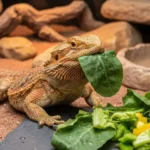
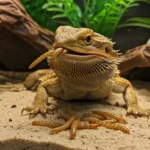
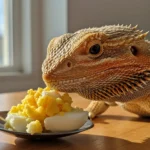
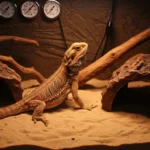

1 thought on “Can Bearded Dragons Eat Worms? What You Must Know”